Creating your own immune-boosting herbal tea blend is simple and effective. Start with a base herb like echinacea or elderberry, known for their immune-supporting properties. Add complementary herbs like ginger or turmeric for flavor and additional benefits. Use 1-2 teaspoons of your blend per cup of hot water, steeping for 5-10 minutes. Aim for 2-3 cups daily, consistently for 3-4 weeks, then take a week-long break. Store your blend in an airtight container away from sunlight to maintain potency. Remember to pair your tea routine with a balanced diet, regular exercise, and stress management for ideal immune health. Discover more ways to enhance your blend's effectiveness and maximize its benefits.
Benefits of Immune-Boosting Herbal Teas
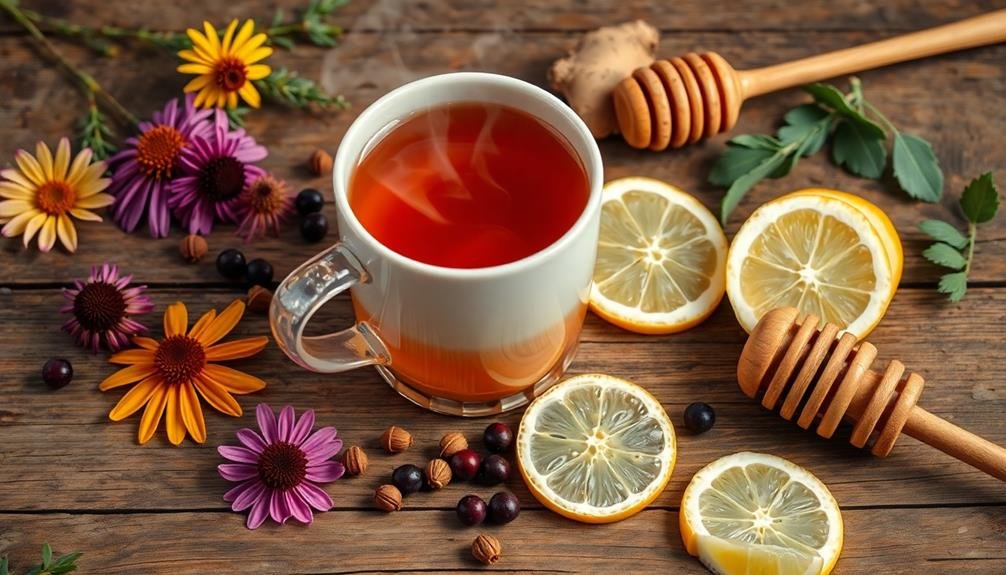
In light of the growing interest in natural health remedies, immune-boosting herbal teas have gained significant popularity. These teas offer a delicious and effective way to support your body's defense mechanisms. By incorporating specific herbs known for their immune-enhancing properties, you can create a powerful blend that helps ward off illnesses and promotes overall well-being.
Immune-boosting herbal teas are rich in antioxidants, which help protect your cells from damage caused by free radicals. They also contain anti-inflammatory compounds that can reduce inflammation throughout your body, potentially lowering your risk of chronic diseases.
Many herbs used in these blends have antimicrobial properties, helping to fight off harmful bacteria and viruses. Regular consumption of immune-boosting herbal teas can enhance your body's ability to produce white blood cells, which are essential for fighting infections.
Some herbs also stimulate the production of interferons, proteins that play a significant role in your immune response. Additionally, these teas can help reduce stress and improve sleep quality, both of which are important for maintaining a healthy immune system.
Essential Herbs for Immune Support
You'll find a variety of powerful herbs that can enhance your immune system.
These immune-boosting herbs often work best when combined in synergistic blends, amplifying their overall effectiveness.
Powerful Immune-Enhancing Herbs
When it comes to fortifying your immune system, certain herbs stand out as powerful allies. Echinacea tops the list, known for its ability to stimulate white blood cell production and fight off infections.
You'll want to include elderberry, which boasts potent antiviral properties and can shorten the duration of colds and flu.
Astragalus root is another immune powerhouse, helping to increase your body's production of interferon, a key component in fighting viral infections.
Don't overlook ginger, which not only aids digestion but also has strong anti-inflammatory and antioxidant effects.
Turmeric, with its active compound curcumin, offers impressive immune-boosting and anti-inflammatory benefits.
Consider adding reishi mushrooms, often called the "mushroom of immortality," for their ability to enhance immune function and reduce stress.
Garlic, a kitchen staple, packs a punch with its allicin content, which helps combat bacteria and viruses.
Finally, licorice root can stimulate the production of interferon and support the immune system's response to infections.
Synergistic Herbal Combinations
While each herb offers unique benefits, combining them strategically can amplify their immune-boosting effects. When creating your herbal tea blend, contemplate pairing herbs that complement each other's properties. For example, combining echinacea with elderberry can enhance antiviral activity, while adding ginger to the mix may increase overall absorption and effectiveness.
Here are some powerful synergistic combinations to contemplate:
- Echinacea + Elderberry: Boosts antiviral defenses
- Astragalus + Reishi: Strengthens overall immunity
- Ginger + Turmeric: Reduces inflammation and supports digestion
- Thyme + Oregano: Provides antimicrobial protection
- Lemon Balm + Chamomile: Promotes relaxation and stress relief
When blending these herbs, aim for a balanced flavor profile that's both enjoyable and effective. Start with equal parts of each herb and adjust to your taste preferences.
Crafting Your Custom Tea Blend
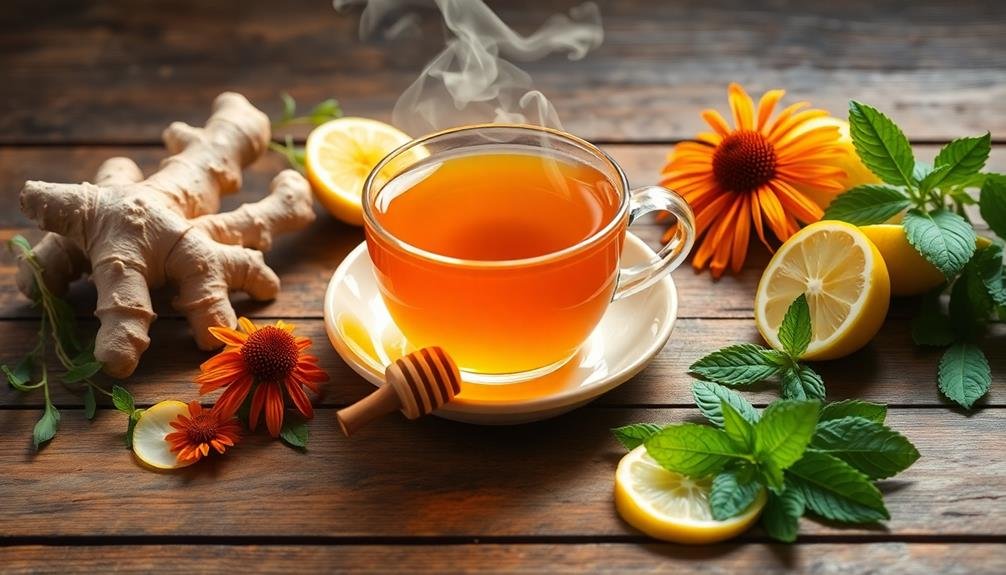
Tea enthusiasts and health-conscious individuals alike can enjoy the process of crafting their own immune-boosting herbal tea blend. To create your custom blend, start by selecting a base herb like echinacea or elderberry, known for their immune-supporting properties.
Then, add complementary herbs such as ginger, lemon balm, or rose hips to enhance the flavor and provide additional health benefits.
Consider the ratio of herbs in your blend, typically using 1-2 teaspoons of dried herbs per cup of water. Experiment with different combinations to find your preferred taste and potency. Don't forget to include a touch of sweetness with herbs like licorice root or stevia leaf if desired.
When mixing your herbs, use clean, dry hands or utensils to combine them thoroughly. Store your custom blend in an airtight container away from direct sunlight to preserve its freshness and potency. Label your creation with the ingredients and date for future reference.
To brew your immune-boosting tea, steep 1-2 teaspoons of your blend in hot water for 5-10 minutes, strain, and enjoy. Remember to consult with a healthcare professional before incorporating new herbs into your diet, especially if you have underlying health conditions or are taking medications.
Proper Brewing Techniques
To access the full potential of your immune-boosting herbal tea blend, mastering proper brewing techniques is essential.
Start by using fresh, cold water and heating it to the appropriate temperature for your blend. Generally, herbal teas benefit from water just below boiling point (around 200°F or 93°C).
Place your herbs in a tea infuser or filter, using about 1-2 teaspoons per cup of water. Pour the hot water over the herbs and cover your cup or teapot to retain heat and essential oils.
Steep for the recommended time, usually 5-10 minutes for most herbal blends, but adjust based on your preferences and the specific herbs used.
After steeping, remove the infuser and enjoy your tea. You can add honey or lemon for extra flavor and immune-boosting properties.
Remember that different herbs may require slight variations in brewing methods, so don't hesitate to experiment to find your perfect cup.
- Use fresh, cold water
- Heat water to just below boiling
- Use 1-2 teaspoons of herbs per cup
- Cover while steeping to retain heat and oils
- Adjust steeping time based on herbs and personal taste
Dosage and Frequency Guidelines
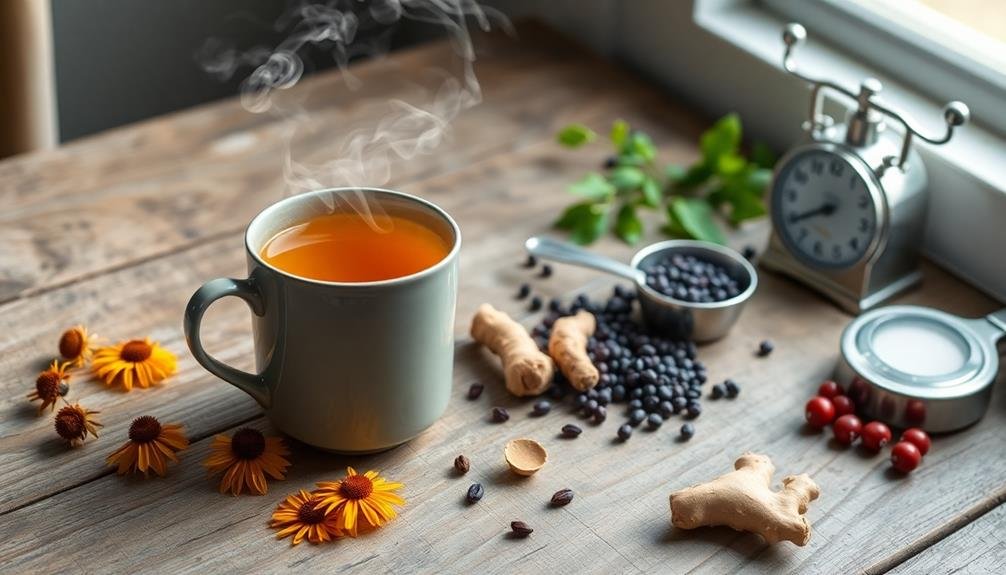
Now that you've mastered brewing techniques, let's focus on how much and how often you should drink your immune-boosting herbal tea blend. Generally, it's safe to consume 2-3 cups of this tea daily. Start with one cup in the morning and another in the evening, gradually increasing to three if desired.
For ideal benefits, drink your herbal tea consistently for 3-4 weeks. After this period, take a week-long break before resuming. This cycle helps prevent your body from developing a tolerance to the herbs' effects.
If you're new to herbal teas, begin with a weaker brew and slowly increase the strength. Pay attention to how your body responds and adjust accordingly. Some people may experience mild side effects like upset stomach or headaches when first introducing new herbs.
Don't exceed 4 cups daily, as overconsumption can lead to unwanted effects. Pregnant women, nursing mothers, and those with pre-existing medical conditions should consult a healthcare professional before incorporating this tea into their routine.
Potential Side Effects
While herbal teas can offer immune-boosting benefits, you should be aware of potential side effects.
You might experience allergic reactions to certain herbs, or the tea could interact with medications you're taking.
Additionally, some herbal blends may cause digestive system disturbances, especially if consumed in large quantities.
Allergic Reactions
Allergies can turn your immune-boosting tea into an unexpected health hazard. When creating your herbal blend, it's essential to be aware of potential allergens and your own sensitivities. Common allergens in herbal teas include chamomile, which can cause reactions in people allergic to ragweed, and echinacea, which may trigger reactions in those with daisy allergies.
Even seemingly harmless ingredients like peppermint or ginger can cause allergic responses in some individuals.
To minimize the risk of allergic reactions:
- Research each herb thoroughly before including it in your blend
- Start with small amounts of new herbs to test your tolerance
- Be cautious if you have known allergies to plants in the Asteraceae family
- Watch for symptoms like itching, swelling, or difficulty breathing
- Consult with a healthcare professional if you're unsure about an herb's safety
If you experience any allergic symptoms after drinking your herbal tea, stop consuming it immediately and seek medical attention if necessary.
Interactions With Medications
Despite their natural origins, herbal teas can interact with medications, potentially causing unexpected side effects or reducing drug efficacy. It's essential to consult your healthcare provider before incorporating herbal teas into your routine, especially if you're taking prescription medications.
Some common herb-drug interactions include:
| Herb | Medication Type | Potential Interaction |
|---|---|---|
| Echinacea | Immunosuppressants | May reduce effectiveness |
| Ginger | Blood thinners | Increased bleeding risk |
| Chamomile | Sedatives | Enhanced sedative effect |
| St. John's Wort | Antidepressants | Reduced drug effectiveness |
| Green tea | Iron supplements | Decreased iron absorption |
Be particularly cautious if you're taking medications for heart conditions, diabetes, or blood clotting disorders. Herbs like ginseng can interfere with blood sugar control, while others like licorice root may affect blood pressure. If you're scheduled for surgery, stop consuming herbal teas at least two weeks prior, as some herbs can increase bleeding risk or interact with anesthesia.
Always inform your doctor and pharmacist about any herbal teas you're drinking. They can help you identify potential interactions and adjust your medication regimen if necessary.
Digestive System Disturbances
Even with their potential health benefits, herbal teas can sometimes cause digestive system disturbances. When consuming immune-boosting herbal blends, you might experience unexpected gastrointestinal effects. These can range from mild discomfort to more severe symptoms, depending on your individual sensitivity and the specific herbs used.
Common digestive issues associated with herbal teas include:
- Nausea or upset stomach
- Bloating and gas
- Diarrhea or constipation
- Abdominal cramps
- Heartburn or acid reflux
To minimize the risk of digestive disturbances, start with small amounts of herbal tea and gradually increase your intake. Pay attention to your body's reactions and discontinue use if you experience persistent discomfort.
Some herbs, like peppermint or ginger, can actually soothe digestive issues, but others may exacerbate them.
If you have a history of digestive problems or conditions like irritable bowel syndrome (IBS), consult your healthcare provider before incorporating new herbal teas into your routine. They can advise you on potential interactions with your existing conditions and help you choose herbs that are less likely to cause digestive upset.
Storing Your Herbal Tea Blend
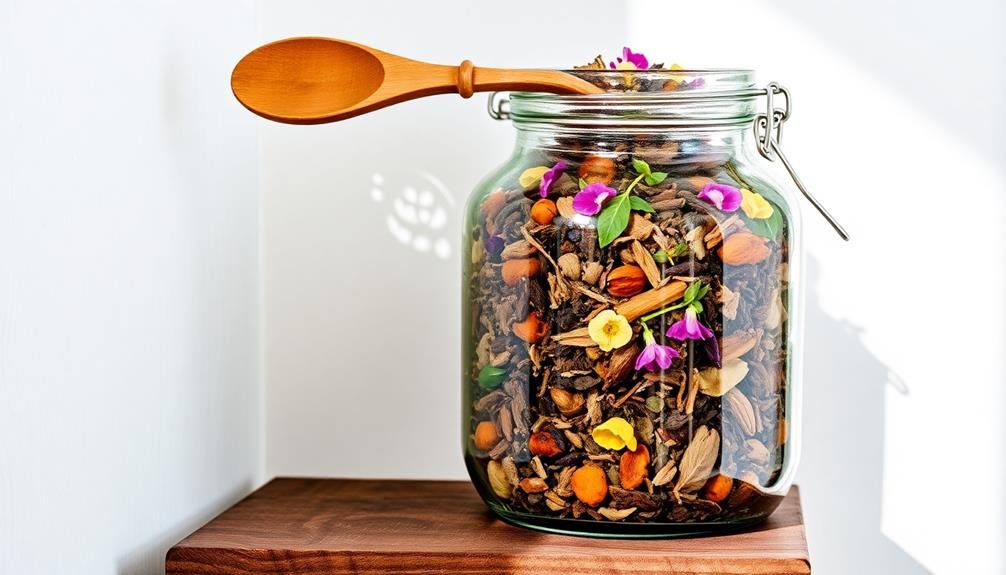
Proper storage is essential for maintaining the potency and freshness of your immune-boosting herbal tea blend. You'll want to keep your herbs away from light, heat, and moisture to preserve their beneficial compounds. Store your blend in an airtight container made of glass or ceramic, as these materials won't impart any unwanted flavors or odors to your herbs.
Choose a cool, dark location for storage, such as a pantry or cupboard. Avoid placing your herbs near heat sources like stoves or radiators. If you've created a large batch, consider dividing it into smaller portions for daily use, keeping the rest sealed and stored properly.
| Storage Method | Pros | Cons |
|---|---|---|
| Glass jar | Airtight, inert | Breakable |
| Ceramic container | Opaque, temperature stable | Can be heavy |
| Tin canister | Lightweight, portable | May impart metallic taste |
Label your container with the blend's ingredients and date of preparation. This practice helps you track freshness and guarantees you use the oldest blends first. Most herbal tea blends remain potent for 6-12 months when stored correctly. However, you'll notice a gradual loss of aroma and flavor over time, indicating it's time to prepare a fresh batch.
Complementary Lifestyle Practices
While sipping your immune-boosting herbal tea can greatly support your health, it's most effective when combined with other lifestyle practices.
To maximize the benefits of your herbal blend, incorporate these complementary habits into your daily routine:
- Get enough sleep: Aim for 7-9 hours of quality sleep each night to allow your body to repair and regenerate.
- Exercise regularly: Engage in moderate physical activity for at least 30 minutes a day to boost circulation and immune function.
- Manage stress: Practice meditation, deep breathing, or yoga to reduce stress levels and support overall well-being.
- Eat a balanced diet: Focus on whole foods, fruits, vegetables, and lean proteins to provide your body with essential nutrients.
- Stay hydrated: Drink plenty of water throughout the day to flush out toxins and keep your body functioning efficiently.
Frequently Asked Questions
Can Children Drink Immune-Boosting Herbal Tea Blends?
You should be cautious when giving children herbal teas. While some blends can be safe, it's best to consult a pediatrician first. They'll advise on age-appropriate options and proper dosages to guarantee your child's safety.
How Long Does It Take to See the Effects of Herbal Teas?
You'll typically notice effects from herbal teas within 15-30 minutes, but long-term benefits may take weeks or months of regular consumption. Remember, everyone's body responds differently, so your experience may vary. Be patient and consistent.
Are There Any Herbs That Shouldn't Be Mixed Together?
Yes, you shouldn't mix certain herbs together. Some combinations can be harmful or reduce effectiveness. It's important to research or consult a herbalist before mixing herbs. Always be cautious with St. John's Wort, as it interacts with many medications.
Can I Use These Herbal Blends if I'm Pregnant or Breastfeeding?
You shouldn't use herbal blends while pregnant or breastfeeding without consulting your healthcare provider first. Some herbs can be harmful to your baby or affect your milk supply. It's always better to err on the side of caution.
Do Immune-Boosting Teas Interact With Prescription Medications?
Yes, immune-boosting teas can interact with prescription medications. You should always consult your doctor before combining them. Some herbs may affect how your body processes drugs or enhance their side effects. It's better to be safe than sorry.
In Summary
You've now got the knowledge to create your own immune-boosting herbal tea blend. Remember to choose your herbs wisely, mix them thoughtfully, and brew them correctly. Start with small amounts and listen to your body. Store your blend properly to maintain its potency. Don't forget that herbal teas work best as part of a holistic approach to health. Pair your tea with a balanced diet, regular exercise, and good sleep for ideal immune support.

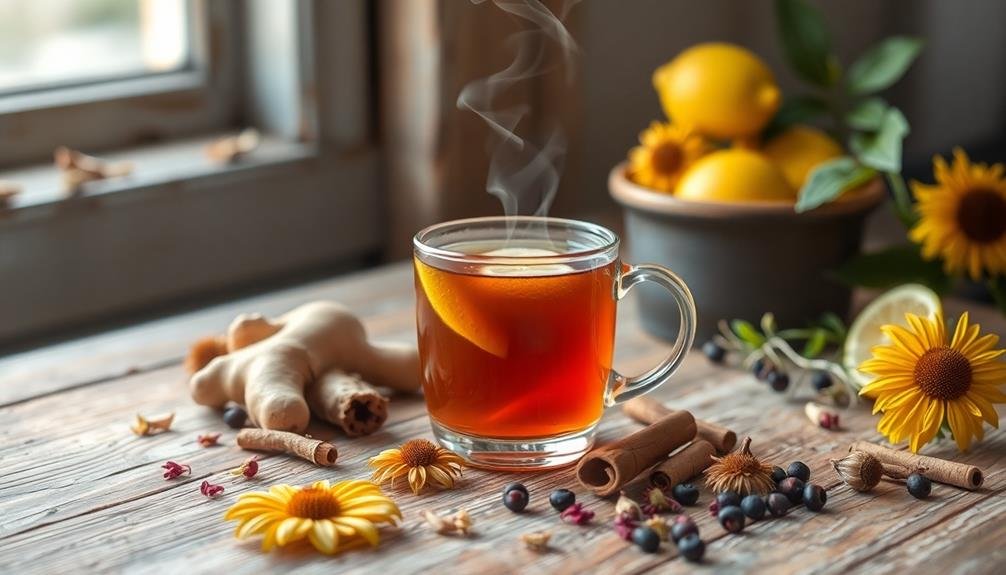


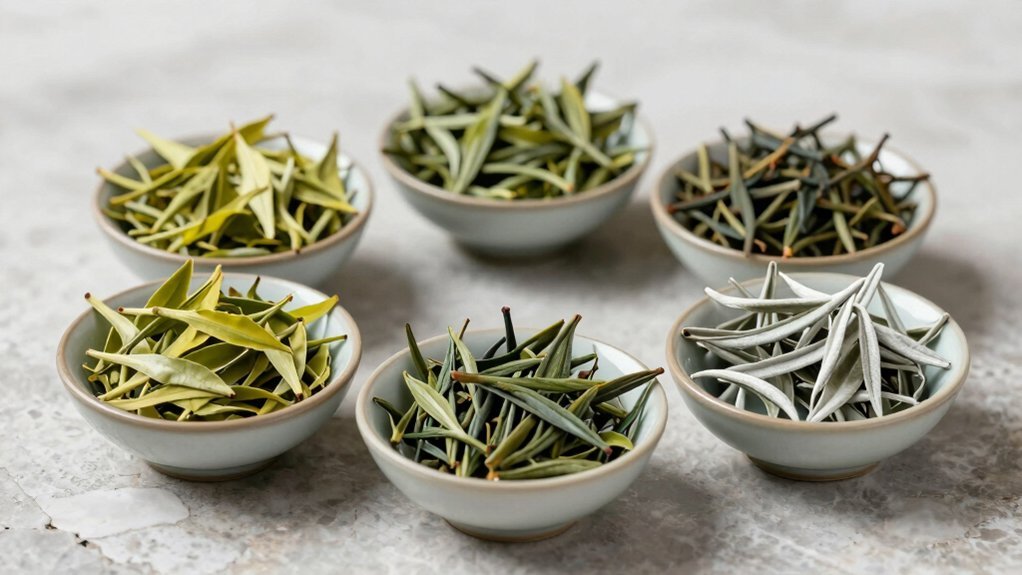
Leave a Reply